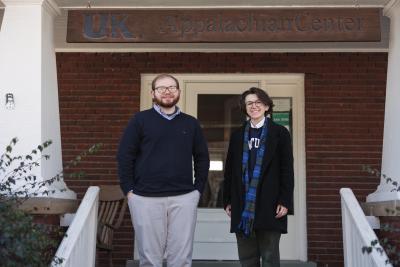College of Arts & Sciences Commencement
The May 2022 Commencement Ceremonies will be held on Friday, May 6th, and Saturday, May 7th at Rupp Arena at the Central Bank Center. For more information, visit https://commencement.uky.edu/.
The May 2022 Commencement Ceremonies will be held on Friday, May 6th, and Saturday, May 7th at Rupp Arena at the Central Bank Center. For more information, visit https://commencement.uky.edu/.
MFA alum Bernard Clay will be with us Wednesday evening at 7 pm in the Gatton Student Center Room 330AB. Please pass the word. He will be reading from his new collection of poems ENGLISH LIT.
Bernard Clay is a Louisville, Kentucky, native who received an MFA in creative writing from the University of Kentucky and is a member of the Affrilachian Poets collective. His work has been published in various journals and anthologies. He currently resides on a farm in eastern Kentucky. English Lit is his first book.

Abstract: Cell death is an invariant feature throughout our lifespan, starting with extensive scheduled cell death during morphogenesis and continuing with death under homeostasis in adult tissues. Additionally, cells become victims of accidental, unscheduled death following injury and infection. Cell death in each of these occasions triggers specific and specialized responses in the living cells that surround them or are attracted to the dying/dead cells. These responses sculpt tissues during morphogenesis, replenish lost cells in homeostasis to maintain tissue/system function, and repair damaged tissues after injury. Wherein lies the information that sets in motion the cascade of effector responses culminating in remodeling, renewal or repair? I will attempt to provide a framework for thinking about cell death in terms of the specific effector responses that accompanies various modalities of cell death. I will discuss an integrated three-fold “cell death code” consisting of information intrinsic to the dying/dead cell, the surroundings of the dying cell and the identity of the responder. I will propose that this can provide a foundation for the prediction of resolving and non-resolving inflammation.
By Richard LeComte
 Summer fun in Appalachia: hiking, climbing, camping, swimming—and holding somebody’s removed femur in a hospital.
Summer fun in Appalachia: hiking, climbing, camping, swimming—and holding somebody’s removed femur in a hospital.
By Richard LeComte
 Lily Vossekuil, Elizabeth Lorch and children working to improve their comprehension came together in the summer of 2021 to show how undergraduates and faculty can collaborate on research that benefits the Kentucky community.
Lily Vossekuil, Elizabeth Lorch and children working to improve their comprehension came together in the summer of 2021 to show how undergraduates and faculty can collaborate on research that benefits the Kentucky community.
Please register for the conference at: https://uky.zoom.us/meeting/register/tZ0kd-2oqjwrHNK456UpiyUVBxjL_0IVpm…;
After registering, you will receive a confirmation email containing the links to join the conference.
27th Annual Black Women’s Conference:
Appalachian Mountains, Digital Valleys, and Everything in Between: Black Feminist Subjectivities
April 15, 2022
10-10:15 AM: Welcome
Anastasia C. Curwood, Director, CIBS and AAAS
10:15-11:45AM: Covid, Clapbacks, and Curation: Blackness in the Digital Era
Kim Gallon, Purdue University,
Regina Hamilton, UK,
Kishonna Gray, UK
Moderated by TBD
12:30-1:45PM: Appalachia Ain’t White: Locating Black Feminists in the Region
Jillean McCommons, University of Virginia
Enkeshi El-Amin, University of Tennessee, Knoxville
Moderated by Kishonna Gray, UK
2:00-3:15PM Reading Buy Black: An Author and Critics Conversation
LaKisha Simmons, University of Michigan
Oneka LaBennett, University of Southern California
Aria Halliday, UK
Moderated by DaMaris Hill, UK
3:30-4:30PM: Keynote: Nazera Wright: Digital Gi(rl)s: Mapping Black Girlhood in the Nineteenth Century
Moderated by Aria Halliday, UK
4:30-4:45PM: Wrap Up
Gallery
The International Village Living and Learning Program, in collaboration with the Office of Student Organizations and Activities, is hosting an international film series that is open to the public.

Tiffany D. Barnes, professor of political science in the University of Kentucky's College of Arts & Sciences, and UK postdoctoral scholar Bomi K. Lee have written an essay for the Washington Post titled "Even after Albright, foreign policy leaders are still mostly men." Their coauthor is Diana Z. O’Brien of Rice University.